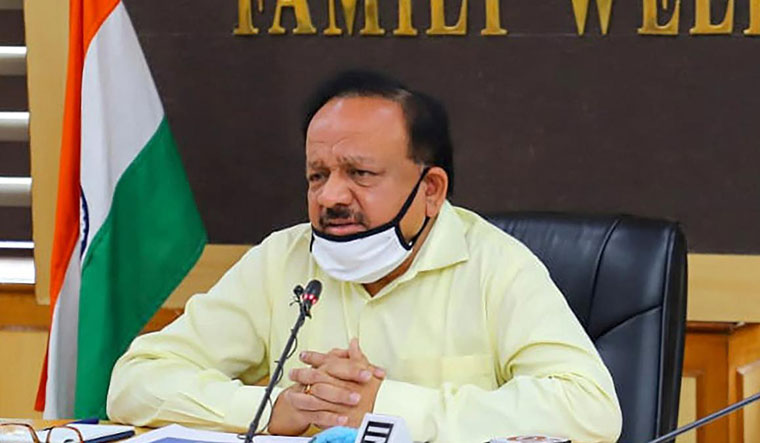The national lockdown prevented lakhs of cases and several thousand deaths, Union health minister Dr Harsh Vardhan said in his suo-moto statement in the Parliament on Monday. In his third briefing for the members of the house on COVID-19—the first two were in February and March—the health minister said that the lockdown prevented "14–29 lakh cases and 37,000–78,000 deaths”, even as he informed the members of the several steps taken by the government to manage the epidemic. The four months of the lockdown were used to create additional health infrastructure, enhance human resource and produce within India critical elements such as PPEs, N-95 masks and ventilators, he added.
The harsh nationwide lockdown has been criticised by several independent experts, though, who have said that far from breaking the chain of transmission, the lockdown hurt the poor and their livelihoods and caused severe economic distress. Cases have continued to rise, and the health infrastructure has been left wanting in several cities and towns hit by the virus, experts say.
Some of the worst hit states in terms of cases and deaths have been Maharashtra, Andhra Pradesh, Tamil Nadu, Karnataka, Uttar Pradesh, Delhi, West Bengal, Bihar, Telangana, Odisha, Assam, Kerala and Gujarat, Vardhan told the Parliament. "All these states have reported more than one lakh cases. With our endeavor to manage COVID-19 through a whole of government, whole of society approach, India has been able to limit its cases and deaths per million to 3,328 cases per million and 55 deaths per million population respectively, which is one of the lowest in the world as compared to similarly affected countries," the minister said.
Vardhan said that many of the epidemiological parameters such as mode of transmission, sub-clinical infection, the period of virus shedding, role of immunity, are still being researched. "Once a person is exposed to the infection, the disease may develop anytime between 1-14 days. The main symptoms of COVID are fever, cough, and difficulty in breathing. In our country about 92 per cent of the cases are reported to be having mild disease," he said. About 5.8 per cent of the cases have required oxygen therapy, and in 1.7 per cent cases, the disease may be severe enough to require intensive care, he added.
Lakhs of citizens had been kept under surveillance—as of September 11, a total of about 40 lakh persons have been kept under surveillance, and "extensive contact tracing" of all positive cases is regularly being undertaken through disease surveillance network, the minister said.
The four months were utilized to create additional health infrastructure, enhance human resource and produce within India critical elements such as PPEs, N-95 masks and ventilators. Dedicated isolation beds have been increased by about 36.3 times, and dedicated ICU beds over 24.6 times of what existed in March 2020, the minister said. "As on 12th September, 2020, a total of 15,284 COVID treatment facilities with 13,14,646 dedicated isolation bed without oxygen have been created. Also, a total of 2,31,093 oxygen supported isolation beds and 62,717 ICU beds (including 32,575 ventilator beds) have been created," he said.
On clinical management of the disease, Vardhan said that no specific antivirals have been proven effective so far and symptomatic treatment for fever and cough, appropriate rehydration, supplemental oxygen therapy remains the mainstay of treatment. However, he added that in India, the drug hydroxychloroquine had been "re-purposed for mild (but high-risk cases) and for moderate cases".
"This was done with limited scientific evidence but well acknowledging that this drug has been used widely in India for other ailments where it is used for prolonged periods of time with a good safety profile," he said. "In addition, provisions for investigational therapies have also been made for using Remdesivir, Convalescent plasma and Tocilizumab for managing severe cases under close medical supervision." The department of pharmaceuticals had increased the production of drug hydroxychloroquine, manifold. As on September 11, 2020, the health ministry had issued 10.84 crore tablets of hydroxychloroquine to states/UTs. India has also exported it to more than 140 countries.
In COVID-19, however, HCQS has been proven to show no benefit—randomised controlled trials in several countries including the RECOVERY trial have shown that the drug shows no benefit in patients of COVID-19. Remdesivir has shown to reduce the length of stay, while studies on plasma therapy in China, India and Netherlands have shown no significant benefit for COVID-19 patients.
Vardhan said that 13 clinical trials including that of repurposed drugs and traditional knowledge were being done to build a portfolio of therapeutic options for COVID-19 patients. "Phase 2 clinical trial of immunomodulator Sepsivac has been completed successfully. Phase 2 clinical trial of the first-ever phytopharmaceutical ACQH is underway. One prophylactic trial of Aswagandha and three trials of guduchi and pippali; yashtimadhu; and polyherbal AYUSH drug (AYUSH-64) are planned on moderately ill COVID-19 patients," he said.
More than 30 vaccine candidates are being supported which are in different stages of development, three candidates are in advanced stages of Phase I/II/III trials, and more than four are in advanced pre-clinical development stages. "COVID-19 Biorepositories have been set-up, which have collected more than 40,000 samples which have been made available to researchers and industry for developing diagnostics, therapeutics and vaccines," he said.
"We have now moved from "managing travel related cases" to containing clusters and large outbreaks due to local transmission to wide spread of infection to urban, peri-urban and rural areas. This would require concerted effort by the government with people’s participation to prevent large scale morbidity and mortality," the minister cautioned. "Equally crucial is to maintain the success achieved in management of reproductive maternal and child health, vaccine preventable diseases, non-communicable diseases, tuberculosis, vector borne diseases such as kala azar and malaria."



